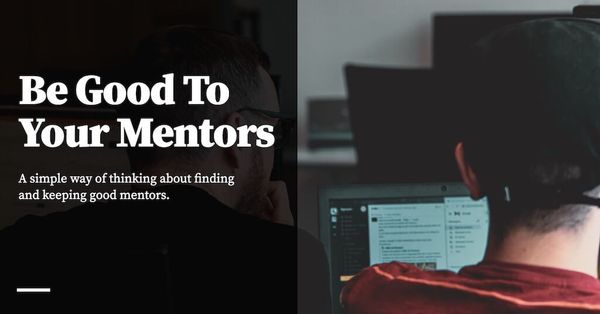The anonymous authors over at the Stay SaaSy blog have this saying about mentorship that I like: “a mentor is just someone who answers questions more than once.”
The way they frame it, career mentorship is not some great, mysterious thing. Career mentors are simply people who give you good advice — repeatedly. Treating your mentors this way means that there’s no ceremony to it. More importantly, so long as you keep this definition in your head, there’s relatively little emotional baggage associated with the relationship. This is usually a good thing.
Of course, if you want to continue asking questions, you better damn well earn the right to do so.
This is an aspect of mentorship that I don’t see being discussed as much. Plenty of junior people I talk to seem to focus on the ‘how’ of mentorship — how do you find mentors? How do you get mentorship within the company you’re in? Less people seem to talk about what a good relationship with a mentor actually looks like.
Of course, with the Stay SaaSy frame available to us, we may reduce the question down to a set of simpler ones: if you want to find a mentor, what you’re really asking is — how do you find people who will answer your questions? And then, the logical follow-up: how do you earn the right to continue asking questions?
When articulated this way, the answers are rather simple:
- There are many people who are willing to answer at least one question.
- You earn the right to continue asking questions by taking action on the last answer the person gives you.
- Then, when you come back to the person, you say some form of “the last time we met, you told me to do so-and-so. I did so-and-so, and here’s what happened … Thank you so much for the advice. By the way, I have a new problem now …”
And that’s how you get a mentor.
There are a few interesting implications to this protocol.
- If the advice that the mentor gives you isn’t particularly helpful, it’s worth asking if you want to continue going to them for advice. (The protocol assumes that you can say “the last time you told me X, and then I did X and here’s what happened” — if you can’t say some form of this, then perhaps you should stop going to this specific person with questions.)
- Also, if you cannot say “the last time you told me X and then I did X” — perhaps because you’ve yet to put it to practice — perhaps you shouldn’t go to said mentor with new questions. It’s surprisingly ok to have long gaps between meetings with your mentors. I sometimes average about one meeting per year with mine — but I try to have meaty updates when I finally do meet them. If your mentors are effective people, they tend to also be very busy. A yearly cadence suits them just fine.
- Most people are receptive to answering further questions if you’ve taken action on their last answer. But a few won’t. This isn’t necessarily a bad thing: if we go by the Stay SaaSy definition above, it just means that they’re not meant to be your mentors. Simple. No drama.
- Finally, and this goes without saying, but you’ll also likely want to be judicious with the questions you ask. I’ve found that coming with a list of problems before meeting can be quite helpful — ordered according to importance. Your mentor might not have much time with you, so you’ll want to focus on questions that are actionable and useful to you (and also so that you can earn the right to ask more questions in the future). But that’s just me — I know I tend to avoid asking more philosophical questions until later on in the relationship, when I’ve earned it. Your context and mileage might differ from mine.
Why does the protocol work? It works because mentors want two things: they want to know that they’re being taken seriously, and they want to know that they’re making a difference in your life. The latter thing is really what they’re getting out of the relationship: mentors want to know that the advice they’re giving is actually helping you succeed, and they derive pleasure from your success since they’ve had a hand in it.
My old boss had this thing he liked to say when put on the other side of the table: “you only want to help those who are helpable.” Good mentors tend to cut people from their lives if they don’t see their advice making much of a difference. One senior developer I know tells me that he gets very demotivated when junior folk (who ostensibly want a mentor relationship with him, or are assigned to him) ignore his advice.
So the inverse is true if you want to have good mentors: be helpable, take their advice seriously, and let them share in your success. Mentorship is not too difficult to get. All it is, when it comes down to it, is the right to keep asking questions. And that’s not so hard to think about now, is it?
Originally published , last updated .
This article is part of the Expertise Acceleration topic cluster. Read more from this topic here→
This article is part of the Operations topic cluster, which belongs to the Business Expertise Triad. Read more from this topic here→





